About
Quick Facts about Fatigue
- Up to 2.5 million Americans are currently suffering from chronic fatigue.1
- Sixty-nine percent of employees are fatigued at work.2
- Almost a third of women report feeling fatigued just one month after giving birth.3
Fatigue is an ongoing feeling of tiredness or weariness. It can cause a decrease in attention span or difficulty concentrating, which is sometimes referred to as brain fog or fuzziness. People feeling the exhausting physical and mental effects of fatigue often have difficulty functioning, which leads to a decreased enjoyment of daily life and - possibly - depression.
Fatigue is characterized by lethargy and a lack of energy, rather than sleepiness. It is difficult to measure and accurately assess fatigue because doctors must rely hugely on the patient's description of the case, rather than a comprehensive physical or diagnostic analysis.
Identifying Fatigue
Fatigue can be separated into two distinct categories; acute fatigue, which is associated with sudden, short-term sleep loss as a result of heavy mental or physical work, and chronic fatigue, which is ongoing.
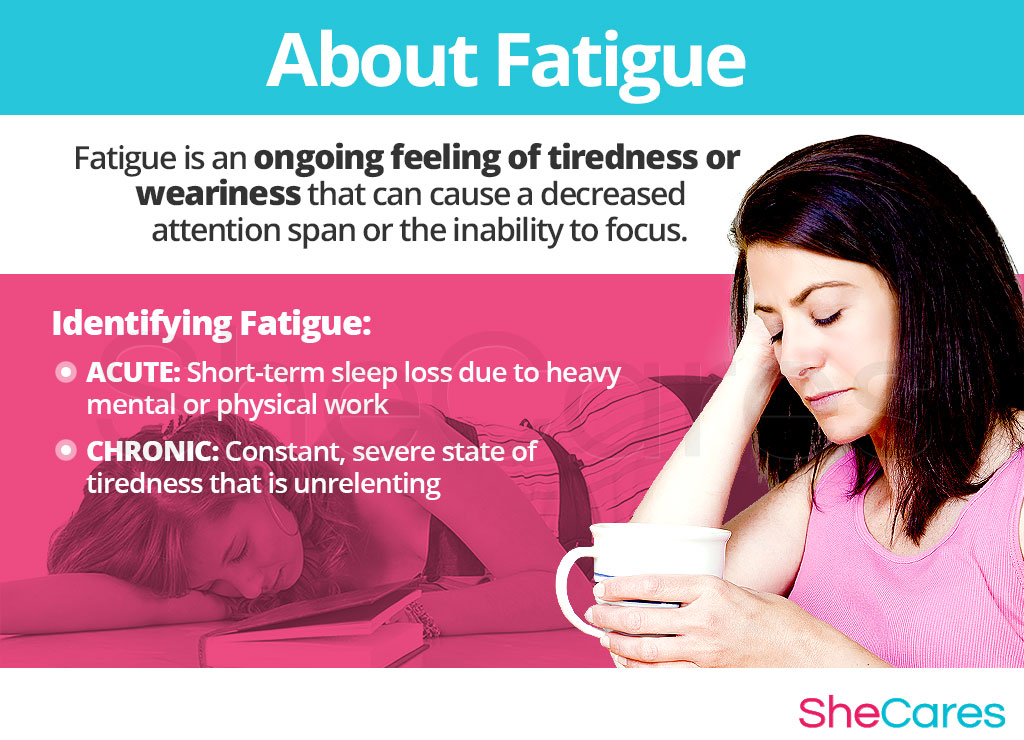
Causes
Learning about the causes of fatigue provides the key to understanding how to prevent and treat the symptom. While the exact causes of fatigue can be attributed to a number of factors, many researchers have discovered hormonal changes to be a hugely important factor, especially during periods of reproductive significance. In addition to this, other factors and medical conditions can also lead to fatigue.
Continue reading to learn more about both the hormonal and additional causes of fatigue.
Hormonal Causes of Fatigue
Fluctuating levels of certain hormones, specifically estrogen and progesterone, can make women more susceptible to frequent, deep fatigue, even after a full night of sleep. This is because these hormones influence the body's levels of melatonin and cortisol, two compounds that strongly influence the quality of sleep and the amount of energy required to conduct any activity. Furthermore, there are also specific factors which can explain the occurrence or severity of fatigue according to the stage of a woman's reproductive life in which the disorder presents itself.
Hormonal Causes during Different Phases in a Woman's Life
Puberty is the stage in which a girl's body begins to produce reproductive hormones. Various lifestyle factors, such as spending too little time sleeping, can contribute to fatigue during puberty. As much as a third of adolescents report substantial fatigue at least four times a week.4
Pregnancy leads to extreme changes in the production of reproductive hormones, which along with other factors, like mood swings or bodily changes, can lead to fatigue.
Postpartum and breastfeeding are other stages where reproductive hormones are imbalanced, leading to symptoms like fatigue. Also, other factors can contribute to fatigue after giving birth, like postpartum depression.
Menopause is the stage in a woman's life when production of reproductive hormones naturally declines, signaling the end of her fertility. As well as hormonal causes, other factors add to the reasons for fatigue during menopause, including the occurrence of other menopause symptoms.
Other Less Common Causes of Fatigue
Though fatigue can occur throughout a woman's life, especially when there is a shift in hormones, occasionally it can be a sign of a more serious underlying condition, like depression, narcolepsy, thyroid dysfunction and insomnia, especially in the case of unrelenting fatigue.
Though a likely cause of fatigue in women is hormonal imbalance, some are more at risk of experiencing fatigue than others. Keep reading to learn more about the risk factors for developing fatigue.
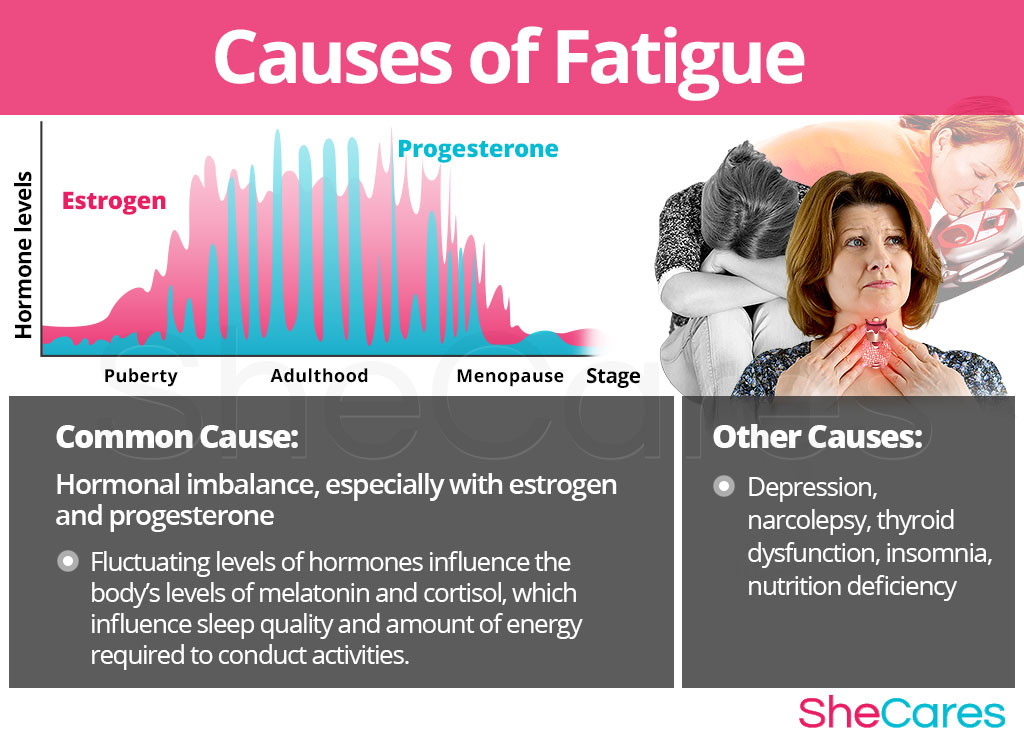
Risk Factors and Triggers
Risk Factors for Fatigue
For different behavioral, psychological, and health reasons, some women are more likely to suffer from fatigue than others. These predisposing factors can affect a woman's hormone levels and increase the chances that she will develop fatigue during her life.
Continue reading to discover more about the most common signs and symptoms of fatigue.
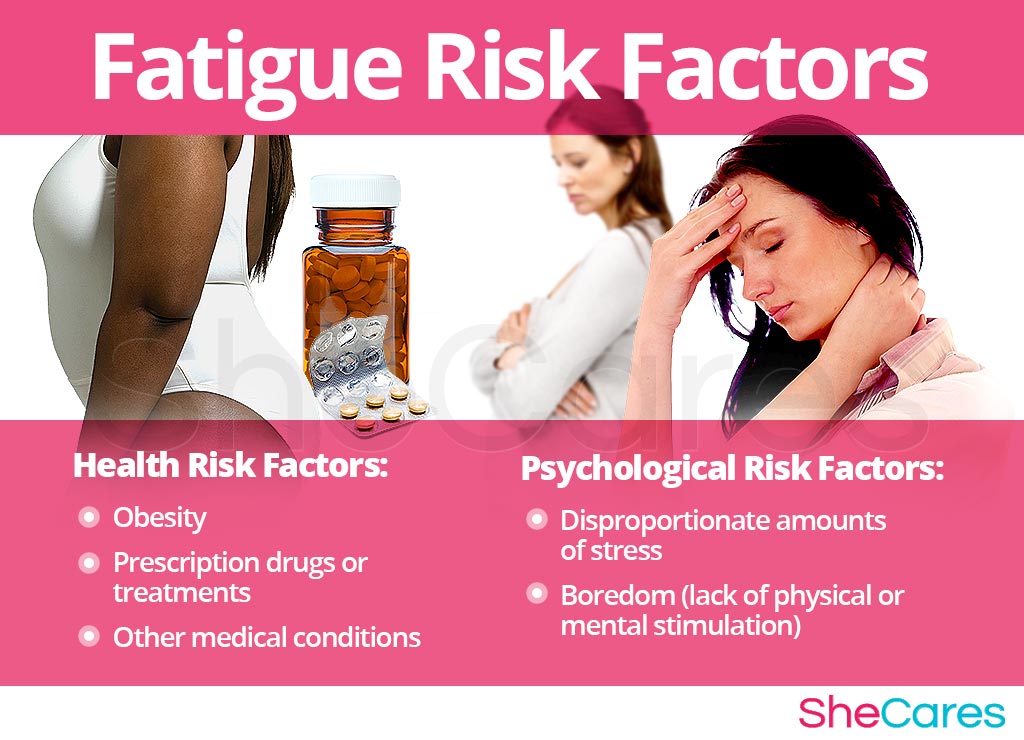
Signs and Symptoms
There are a variety of medical signs and symptoms that help to identify fatigue. Keep reading to learn more about them and what to expect during a doctor's visit.
Common Symptoms of Fatigue
- Feeling extremely weak or exhausted
- Inability to concentrate, mind feeling foggy
- Slower reaction times (mental and/or physical)
- Irritability, low tolerance for stress
- Lack of energy
- Headaches
- Slower reaction times (mental and/or physical)
- Chronic tiredness or sleepiness
- Low motivation
Signs of Fatigue
Beyond symptoms of fatigue, there are also medical indicators that can be assessed by a healthcare professional and may be taken into account when diagnosing the disorder:
- Estrogen levels. Fatigue can be caused by a hormonal imbalance of estrogen, especially during puberty, pregnancy, postpartum, and menopause. Estrogen tests - of blood, urine, or saliva - can help determine if a woman's levels are within range for her age and reproductive stage.
- Time and duration of symptoms. It might be a good idea to record feelings of fatigue in a journal. Include when it occurs (time of day and how frequently), food consumed, stress levels, exercise, and any additional relevant information. This may help to establish a pattern to see if fatigue is caused by a habit or routine, like overeating or stress or work. Keep in mind that fatigue that lasts longer than six months is considered chronic.
Diagnosis of Fatigue
A doctor will also perform three assessments in order to diagnose and identify fatigue. He or she will review medical history, conduct a physical exam, and finish with a psychological evaluation. If necessary, additional tests may be ordered.
Complications of Fatigue
Mild cases of fatigue can occur as a natural part of the hormonal changes associated with a woman's menstrual cycle without taking a toll on her daily activities. However, chronic fatigue caused by hormonal imbalance can interfere with the quality of a woman's life.
In rare cases, when chronic fatigue is left untreated, it can lead to certain complications, which present further risks to a woman's mental health. These possible, but uncommon, complications of fatigue can include depression or a reduced reaction time.
Women who experience frequent symptoms of fatigue that are interfering with their daily lives may wish to treat or learn how to prevent the condition.
Keep reading below to learn useful techniques and habits that will prevent fatigue or make it more manageable.
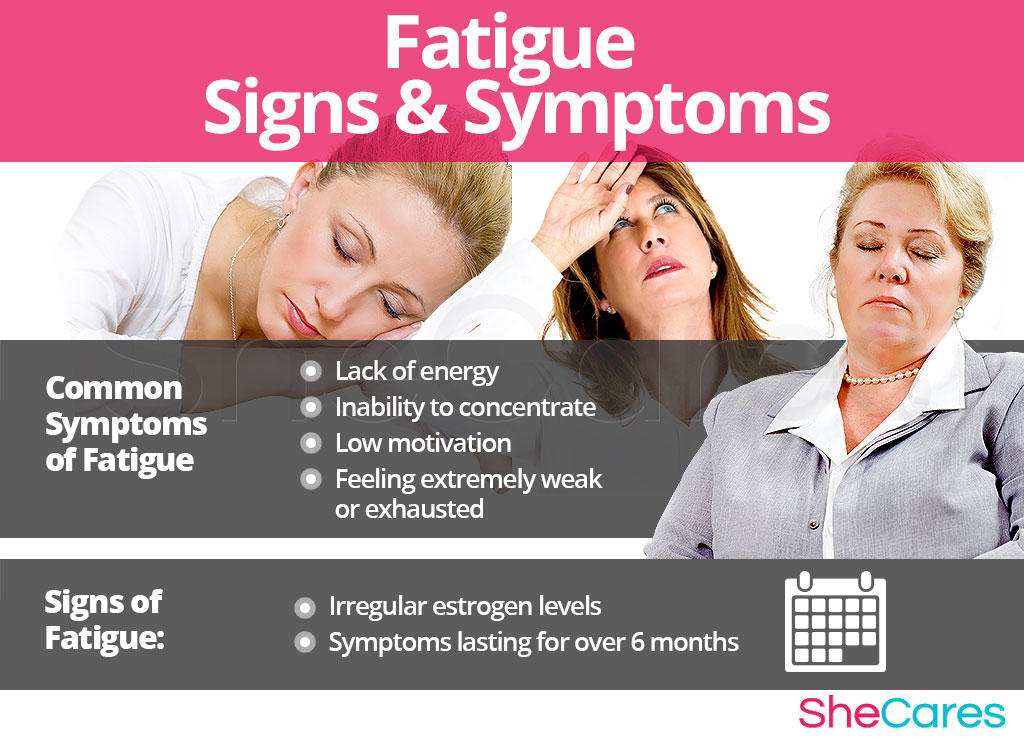
Prevention and Management
Preventing Fatigue
There are many different things that a person suffering from fatigue can do to prevent and manage symptoms. While there is no one single cure for fatigue, there are changes that a woman can make in her life, which will help to decrease the mental and physical effects of fatigue.
Home care is the first and most important line of treatment available to combat fatigue. Focusing on diet, exercise, and healthy habits can have a huge impact on preventing or easing symptoms of fatigue.
Managing Fatigue
When a woman happens to be experiencing fatigue, there are things that she can do to manage it effectively. Simple changes like prioritizing tasks and getting support can greatly assist a woman as she is trying to combat fatigue.
Alternative Management Tips for Fatigue
Alternative treatments are also a great way to alleviate the symptoms of fatigue in the short term. They include acupuncture and cognitive behavioral therapy.
While aforementioned measures often help to reduce the symptoms of fatigue, they are unable to treat the root of the problem, which in many is hormonal imbalance. However, there are several natural treatments that can treat the hormonal causes of fatigue. Please continue to the next section to learn more about treating fatigue.
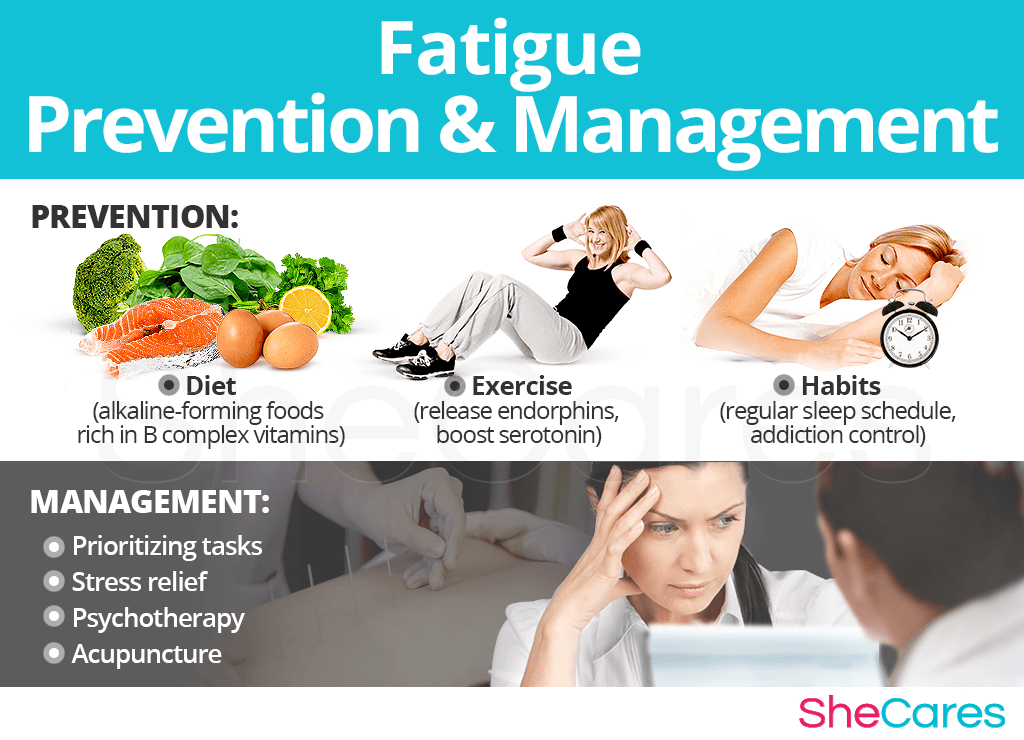
Treatments
The treatment of fatigue, whether acute or chronic, is important in order to prevent it from getting worse or developing into a complication.
Three Approaches to Treat Fatigue
There are three levels of treatment for fatigue, which are (1) Lifestyle Changes, (2) Alternative Medicine and (3) Pharmaceutical Options.
It is always recommended to start with the non-invasive approach, lifestyle adjustments, which tends to be the least risky and least expensive, although it does require the highest amount of self-dedication. Then, proceed to the next level of care if necessary.
While medical intervention is not usually necessary to treat fatigue, some women who are unable to find relief from lifestyle changes and alternative medicine may wish to consider pharmaceutical options, only after properly evaluating the risks associated with such a treatment.
Lifestyle Changes for Fatigue
The first level of treatment involves the least amount of risk, but it requires women to take their new routine seriously. A good diet alongside wholesome habits can do wonders in increasing one's energy levels.
As aforementioned with preventing fatigue, women should eat smaller meals more frequently - composed of whole fruits and vegetables - throughout the day to avoid an energy crash; partake in regular exercise to release endorphins and boost serotonin levels; and maintain a regular sleep schedule in lieu of stressors, addictions, and an excessive consumption of simple sugars.
It is worth noting that most cases of acute fatigue can be reversed by rest. Aim to have sleep that is refreshing, instead of hitting a specific number of hours each night. Also, it is fine to take naps as long as they are not longer than one hour, which will cause grogginess and likely a subsequent inability to sleep during the night.
While lifestyle changes alone can improve fatigue, they do not directly address the hormonal imbalance behind it. Alternative medicine has proven to be an excellent way of treating fatigue and hormonal imbalances in a safe and natural way.
Alternative Medicine for Fatigue
Alternative medicines and supplements involve minimal risk and can be effective to treat fatigue. There are two different types of herbal supplements available: phytoestrogenic and hormone-regulating herbal supplements.
Phytoestrogenic herbal supplements
Phytoestrogenic herbs like black cohosh and red clover contain estrogenic components that are produced by plants, thus adding estrogen to the body.These herbs are mainly effective for women suffering from fatigue due to low estrogen levels and are, therefore, not necessarily effective for other types of hormonal imbalance, or for those going through puberty or pregnancy.
Moreover, they are not recommended for long-term use because they may make a woman's body less capable of producing its own estrogen.
Hormone-regulating herbal supplements
Hormone-regulating herbal supplements, including Macafem, stimulate a woman's natural hormone production by directly nourishing the pituitary and endocrine glands.
These supplements can be considered the safest natural way to treat a hormonal imbalance behind fatigue.
Furthermore, they can be taken throughout a woman's life - except during pregnancy - as they support the body's natural hormone production.
In addition, there are other types of nutritional supplements that can make fatigue symptoms easier to manage.
A combination of approaches is usually the most effective route to take. Lifestyle changes combined with alternative medicine or nutritional supplements will most likely be the best way to alleviate the symptoms of chronic fatigue. However, for some women the symptoms will be so severe that more advanced treatment is necessary.
Pharmaceutical Options for Fatigue
If neither lifestyle habits nor alternative treatments provide relief from fatigue symptoms, it may be necessary to take drugs recommended by a healthcare professional.
However, pharmaceutical interventions involve the highest risk and often the highest costs, and not all treatments are suitable for women at every life stage. Many medications can be risky for women who are pregnant or lactating. It is strongly recommended to speak to a licensed physician before starting any pharmaceutical treatments for fatigue.
There are some main types of pharmaceutical options that can be prescribed to treat fatigue, such as oral contraceptives or mood-regulating medication.
These three approaches are not mutually exclusive. A woman may use different approaches at different times or any combination of them, depending on the duration and severity of symptoms. Today more and more women find that dealing with symptoms of fatigue is best accomplished via a combination of healthy lifestyle and alternative treatments.
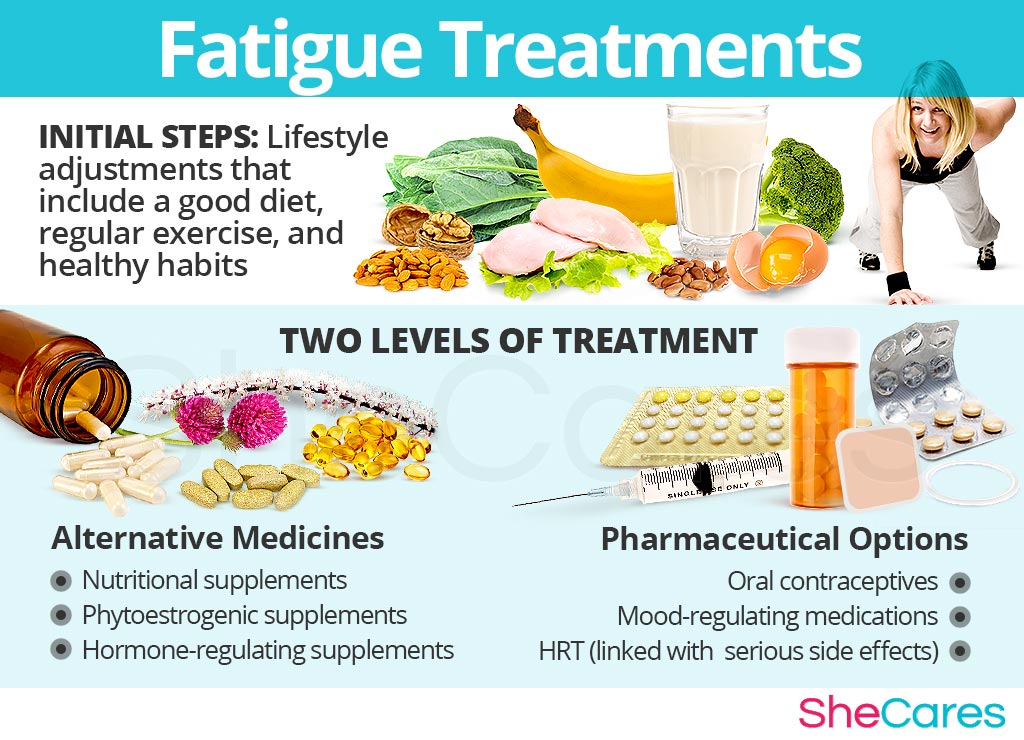
Sources
- AARP. (2012). 9 Types of Medications That Can Lead to Chronic Fatigue. Retrieved October 3, 2019, from https://www.aarp.org/health/drugs-supplements/info-06-2012/medications-that-cause-chronic-fatigue.html
- American Cancer Society, (2017). How to Handle Fatigue. Retrieved October 4, 2019, from https://www.cancer.org/latest-news/how-to-handle-fatigue.html
- American Pregnancy Association. (2019). Fatigue during Pregnancy | Nesting during Pregnancy. Retrieved October 3, 2019, from https://americanpregnancy.org/your-pregnancy/fatigue-during-pregnancy/ | https://americanpregnancy.org/planning/nesting-during-pregnancy/
- Better Health Channel. (2015). Fatigue fighting tips. Retrieved February 12, 2021 from https://www.betterhealth.vic.gov.au/health/ConditionsAndTreatments/fatigue-fighting-tips
- Canadian Centre for Occupational Health & Safety. (2017). Fatigue. Retrieved October 3, 2019, from https://www.ccohs.ca/oshanswers/psychosocial/fatigue.html
- Cleveland Clinic. (2019). Feeling Fatigued? Could It Be Magnesium Deficiency? (And If So, What to Do About It!) Retrieved October 4, 2019, from https://health.clevelandclinic.org/feeling-fatigued-could-it-be-magnesium-deficiency-and-if-so-what-to-do-about-it/
- Findlay, S.M. (2008). The tired teen: A review of the assessment and management of the adolescent with sleepiness and fatigue. Paediatrics & Child Health, 13(1), 37-42. Retrieved October 4, 2019, from https://www.ncbi.nlm.nih.gov/pmc/articles/PMC2528817/
- Harvard Health Publishing. (2013). Vitamin B12 deficiency can be sneaky, harmful. Retrieved October 4, 2019, from https://www.health.harvard.edu/blog/vitamin-b12-deficiency-can-be-sneaky-harmful-201301105780
- Jaehne, A. et al. (2009). Effects of nicotine on sleep during consumption, withdrawal and replacement therapy. Sleep Medicine Reviews, 13(5), 363-77. doi: 10.1016/j.smrv.2008.12.003.
- Mayo Clinic. (2017). Tween and teen health: Why is your teen so tired? | Symptoms of pregnancy: What happens first? | Postpartum depression: Symptoms & causes | Fatigue: Causes | Chronic fatigue syndrome: Diagnosis & treatment. Retrieved October 3, 2019, from https://www.mayoclinic.org/healthy-lifestyle/tween-and-teen-health/in-depth/teens-health/art-20046157 | https://www.mayoclinic.org/healthy-lifestyle/getting-pregnant/in-depth/symptoms-of-pregnancy/art-20043853 | https://www.mayoclinic.org/diseases-conditions/postpartum-depression/symptoms-causes/syc-20376617 | https://www.mayoclinic.org/symptoms/fatigue/basics/causes/sym-20050894 | https://www.mayoclinic.org/diseases-conditions/chronic-fatigue-syndrome/diagnosis-treatment/drc-20360510
- MedlinePlus. (2017). Fatigue. Retrieved October 3, 2019, from https://medlineplus.gov/ency/article/003088.htm
- Mirza, S. (2015). Serotonin, chronic fatigue syndrome and mitochondrial dysfunction. BMJ, 350. doi: 10.1136/bmj.h1771
- National Institute for Health and Care Excellence. (2015). Benefits and risks of HRT. Retrieved October 4, 2019, from https://www.nice.org.uk/guidance/ng23/ifp/chapter/Benefits-and-risks-of-HRT
- National Institutes of Aging. (2019). Fatigue in Older Adults. Retrieved October 3, 2019, from https://www.nia.nih.gov/health/fatigue-older-adults
- National Sleep Foundation. (n.d.). How Alcohol Affects the Quality—And Quantity—Of Sleep. Retrieved October 4, 2019, from https://www.sleepfoundation.org/articles/how-alcohol-affects-quality-and-quantity-sleep
- NHS. (2018). Self-help tips to fight tiredness. Retrieved February 12, 2021 from https://www.nhs.uk/live-well/sleep-and-tiredness/self-help-tips-to-fight-fatigue/
- NHS. (2019). Study suggests HRT carries higher risk of breast cancer than thought. Retrieved October 4, 2019, from https://www.nhs.uk/news/cancer/study-suggests-hrt-carries-higher-risk-breast-cancer-thought/
- Pregnancy, Birth & Baby. (2017). Recovery after a caesarean. Retrieved October 3, 2019, from https://www.pregnancybirthbaby.org.au/recovery-after-a-caesarean
- Targum, S.D. & Fava, M. (2011). Fatigue as a Residual Symptom of Depression. Innovations in Clinical Neuroscience, 8(10), 40-43. Retrieved October 3, 2019, from https://www.ncbi.nlm.nih.gov/pmc/articles/PMC3225130/
- Victoria State Government. (2015). Fatigue fighting tips. Retrieved October 4, 2019, from https://www.betterhealth.vic.gov.au/health/conditionsandtreatments/fatigue-fighting-tips
- Viner, R. & Christie, D. (2005). Fatigue and somatic symptoms. BMJ, 330(7498), 1012-1015. doi: 10.1136/bmj.330.7498.1012
- Winchester Hospital. (n.d.). Nicotinamide Adenine Dinucleotide. Retrieved October 4, 2019, from https://www.winchesterhospital.org/health-library/article?id=21810
Footnotes:
- Centers for Disease Control and Prevention. (2019). Myalgic Encephalomyelitis/Chronic Fatigue Syndrome. Retrieved October 3, 2019, from https://www.cdc.gov/me-cfs/index.html
- National Safety Council. (2018). 69% of Employees - Many in Safety-critical Jobs - are Tired at Work. Retrieved October 3, 2019, from https://www.nsc.org/in-the-newsroom/69-percent-of-employees-many-in-safety-critical-jobs-are-tired-at-work-says-nsc-report
- Henderson, J. et al. (2019). Factors associated with maternal postpartum fatigue: an observational study. BMJ Open 2019, 9(7). doi: 10.1136/bmjopen-2018-025927
- Viner, R. (2005). Fatigue and somatic symptoms. BMJ, 330(7498), 1012-1015. doi: 10.1136/bmj.330.7498.1012
- Mayo Clinic. (2017). Iron deficiency anemia during pregnancy: Prevention tips. Retrieved October 3, 2019, from https://www.mayoclinic.org/healthy-lifestyle/pregnancy-week-by-week/in-depth/anemia-during-pregnancy/art-20114455
- American Psychological Association. (n.d.). Postpartum Depression. Retrieved October 3, 2019, from https://www.apa.org/pi/women/resources/reports/postpartum-depression
- American Academy of Sleep Medicine. (2012). Obesity, depression found to be root causes of daytime sleepiness. Retrieved October 3, 2019, from https://aasm.org/obesity-depression-found-to-be-root-causes-of-daytime-sleepiness/
- NHS. (2018). Self-help tips to fight tiredness. Retrieved October 4, 2019, from https://www.nhs.uk/live-well/sleep-and-tiredness/self-help-tips-to-fight-fatigue/
- Schwalfenberg, G.K. (2012). The alkaline diet: is there evidence that an alkaline pH diet benefits health? Journal of Environmental and Public Health, 2012, 727630. doi: 10.1155/2012/727630
- Bansal, A. et al. (2015). The effect of regular physical exercise on the thyroid function of treated hypothyroid patients: An interventional study at a tertiary care center in Bastar region of India. Archives of Medicine & Health Sciences, 3(2), 244-246. doi: 10.4103/2321-4848.171913
- Ciloglu, F. et al. (2005). Exercise intensity and its effects on thyroid hormones. Neuro Endocrinology Letters, 26(6), 830-834. Retrieved October 4, 2019, from https://www.ncbi.nlm.nih.gov/pubmed/16380698
- Xu, Y.X. et al. (2019). Acupuncture in the treatment of chronic fatigue syndrome based on "interaction of brain and kidney" in TCM: a randomized controlled trial. Chinese Acupuncture & Moxibustion, 39(2), 123-127. doi: 10.13703/j.0255-2930.2019.02.003
- Windthorst, P. et al. (2017). Heart rate variability biofeedback therapy and graded exercise training in management of chronic fatigue syndrome: An exploratory pilot study. Journal of Psychosomatic Research, 93, 6-13. doi: 10.1016/j.jpsychores.2016.11.014
- Castro-Marrero, J. (2018). Low omega-3 index and polyunsaturated fatty acid status in patients with chronic fatigue syndrome/myalgic encephalomyelitis. Prostaglandins, Leukotrienes & Essential Fatty Acids, 139, 20-24. doi: 10.1016/j.plefa.2018.11.006








